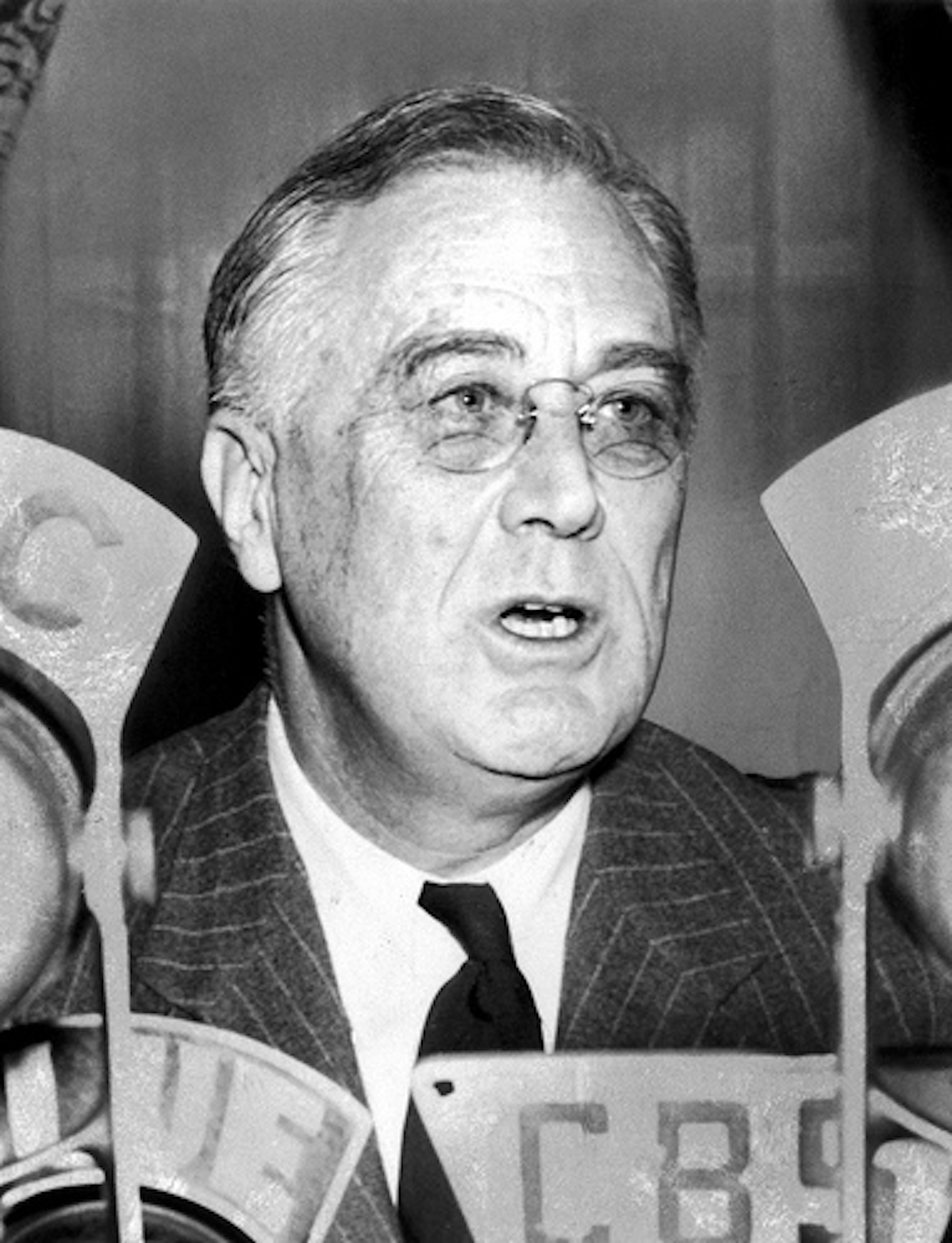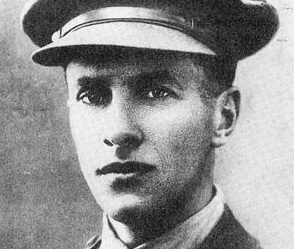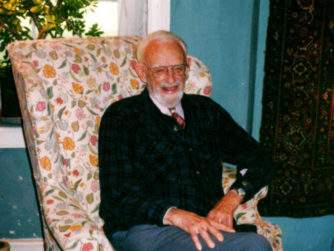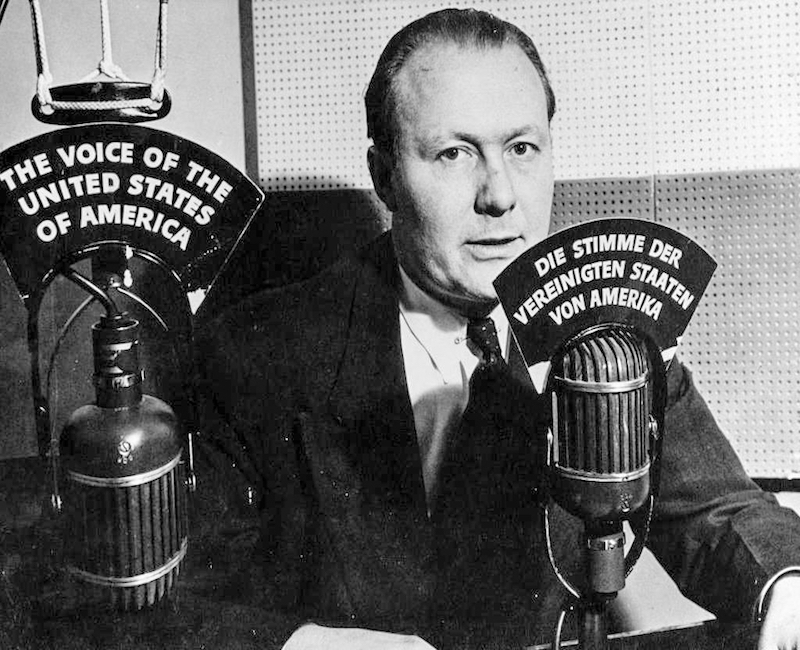President Franklin Delano Roosevelt established the Office of War Information (OWI) on June 13, 1942 through the Executive Order 9182. The OWI operated within the Office for Emergency Management in the Executive Office of the President. FDR appointed the OWI director who reported directly to him. The new agency combined several pre-existing U.S. federal government offices, including the Office of the Coordinator of Information, which in February 1942 launched shortwave radio broadcasts for overseas audiences from its studios in New York. A few years later, these broadcasts became officially know as the Voice of America.
The agency was charged with providing information about the war for both Americans and foreign audiences. It was also charged with countering German-Nazi and Japanese government propaganda and supporting the U.S. military with psychological warfare. The OWI domestic propaganda activities became controversial and were quickly defunded by the U.S. Congress through bipartisan votes. Some U.S. media reports and some members of Congress of both parties started to disclose excessively pro-Soviet views of key OWI officials and communist sympathies of Voice of America journalists.
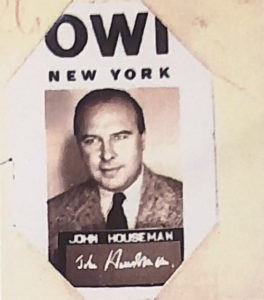
Programming and management scandals at the Office of War Information and the Voice of America during the war years also led to the forced resignation in 1943 of John Houseman, the future Hollywood actor who was declared later, somewhat erroneously, to have been the first VOA director, although his job was the chief radio producer, while program content was determined by Robert E. Sherwood and a pro-Soviet fellow traveler journalist, Joseph F. Barnes.
The real reasons behind Houseman’s resignation were kept secret and later covered up by Voice of America officials who may have known about his preference for hiring pro-Soviet communist sympathizers.[ref]Ted Lipien, “First VOA Director Was a Pro-Soviet Communist Sympathizer, State Dept. Warned FDR White House,” Cold War Radio Museum (blog), May 5, 2018, https://www.coldwarradiomuseum.com/first-voa-director-was-a-pro-soviet-communist-sympathizer-state-dept-warned-fdr-white-house/.[/ref] One of his proteges was the first VOA chief news writer and editor, Howard Fast, who joined the Communist Party and in 1953 received the Stalin Peace Prize.[ref]Ted Lipien, “Created 70 Years Ago, Stalin Peace Prize Went in 1953 to Former Voice of America Chief News Writer Howard Fast,” Cold War Radio Museum (blog), December 21, 2019, https://www.coldwarradiomuseum.com/created-70-years-ago-stalin-peace-prize-went-in-1953-to-former-voice-of-america-chief-news-writer-howard-fast/.[/ref] Because the OWI’s and VOA’s leadership was chaotic and ineffective, the U.S. State Department, not exactly anti-Soviet at the time considering that the Soviet Union was then America’s major military ally against Hitler, refused to issue Houseman a U.S. passport for his planned official trip on VOA’s business to Europe. He resigned shortly afterward. The State Department official who warned the White House about Soviet influence over Voice of America broadcasts, and specifically about John Houseman, was President Roosevelt’s personal friend and foreign policy advisor, Under Secretary of State Sumner Welles, a person of liberal but not pro-Soviet or pro-communist views.[ref]Ted Lipien, “First VOA Director Was a Pro-Soviet Communist Sympathizer, State Dept. Warned FDR White House,” Cold War Radio Museum (blog), May 5, 2018, http://www.coldwarradiomuseum.com/state-department-warned-fdr-white-house-first-voice-of-america-director-was-hiring-communists/. Under Secretary of State Sumner Welles April 6, 1943 memorandum to Marvin H. McIntyre, Secretary to the President with enclosures, Franklin D. Roosevelt Library and Museum Website, Box 77, State – Welles, Sumner, 1943-1944. From Collection: FDR-FDRPSF Departmental Correspondence, Series: Departmental Correspondence, 1933 – 1945 Collection: President’s Secretary’s File (Franklin D. Roosevelt Administration), 1933 – 1945, National Archives Identifier: 16619284.[/ref]

United States Government Manual – 1945 (March) First Edition, edited by the Division of Public Inquiries in the Office of War Information in Washington, D.C. and published by the Government Printing Office, contains an early and possibly the first official reference to the “Voice of America” name for World War II U.S. government’s shortwave overseas radio broadcasts.[ref]Ted Lipien, “80 Years of VOA: Different Names of the Voice of America, Voice of America – 80 Years of Hidden History,” Voice of America – 80 Years of Hidden History (blog), accessed May 13, 2022, https://www.voa80.com/2022/02/01/80-years-of-voa-different-names-of-the-voice-of-america/.[/ref] The one-sentence reference is not officially associated with any specific office producing VOA programs within the OWI. Shortwave radio broadcasts, which acquired the Voice of America name only after the war, were produced by the Overseas Operations Branch in the Radio Program Bureau in the OWI’s New York Office.
As described in the United States Government Manual, the purpose of the Office of War Information, including its radio broadcasting operation, was to help in the war effort against Nazi Germany and Japan:
a. Formulate and carry out, through the use of press, radio, motion picture, and other facilities, information programs designed to facilitate the development of an informed and intelligent understanding, at home and abroad, of the status and progress of the war effort, and of the war policies, activities, and aims of the Government. b. Coordinate the War informational activities of all Federal departments and agencies for the purpose of assuring an accurate and consistent flow of war information to the public and the world at large. c. Obtain, study, and analyze information concerning the war effort and advise the agencies concerned with the dissemination of such information as to the most appropriate and effective means of keeping the public adequately and accurately informed. d. Review, clear, and approve all proposed radio and motion picture programs sponsored by Federal departments and agencies; and serve as the central point of clearance and contact for the radio broadcasting and motion picture industries, respectively, in their relationships with Federal departments and agencies concerning such Government programs. e. Maintain liaison with the information agencies of the United Nations for the purpose of relating the Government’s informational programs and facilities to those of such nations.
The description of OWI’s mission abroad, written by OWI staffers and approved by the agency’s director, mentioned that “The Overseas Operations Branch plans and executes the wartime information and propaganda activities of the United States Government in all countries outside the Continental limits of the United States, except Central and South America.”
It also underscored the OWI’s close links with the U.S. military in carrying out psychological warfare operations.
In active military zones, the Office of War Information works with United States and Allied military agencies in the prosecution of psychological warfare. OWI outposts operate in more than a score of allied and neutral nations. In other areas OWI provides State Department missions with informational materials for distribution.
The Manual also pointed out that “Through radio broadcasts, newspapers, publications, motion pictures, news pictures, exhibits, and other media, the Overseas Branch works to”:
1. Undermine the enemy’s morale and will to fight. 2. Strengthen the resistance of the peoples of enemy-occupied territories. 3. Create friendlier relations with the peoples of areas where our forces are stationed or which are traversed by our military supply lines. 4. Inform other nations of the part the United States is playing in the war. 5. Convince neutral nations that a United Nations victory is inevitable and desirable. 6. Generally engender a better understanding abroad of the United States, its war aims and its post-war interests and purposes. Headquarters of the Overseas Branch are in Washington, Other offices are maintained in New York and San Francisco.
What is now the Voice of America was officially called in 1945 “Radio Program Bureau.”
This Bureau is responsible for the preparation and production of all short-wave radio programs originating in the Atlantic area, the translating of all foreign language productions – publications, motion pictures, and feature materials – and for servicing cooperating medium-wave radio stations in foreign countries with recordings and other programming. Broadcasts are conducted in about 20 languages with about 1,500 broadcasts a week.
The Manual also mentioned that the Basic News Division in the separate News and Features Bureau “supplies a daily news report for use on shortwave news broadcasts produced by the Radio program Bureau and for the output of the Cable-Wireless Division.”
It was clear that the Office of War Information was an all-media, all-civilian propaganda, and all-public diplomacy operation of the U.S. government, combining what are now separate roles: the Voice of America’s media outreach and the State Department’s public. The Manual noted that the OWI had outposts and personnel in many countries, including Australia, China, England, France, and the USSR.
Coordination of Voice of America and Soviet propaganda and its coverup
What the American public did not know was that during that time, the Office of War Information also secretly coordinated Voice of America radio propaganda with Soviet propagandists through contacts with the Soviet Embassies and with the enthusiastic support of most of its radically left-leaning editors and broadcasters. Most of these senior-level contacts were in London rather than in Moscow or Washington. The chief coordinator of OWI and VOA propaganda with Soviet propaganda, who, in carrying out this mandate, was meeting with the Soviet representatives in London, was the director of the OWI’s Overseas Operations Branch, Robert E. Sherwood. He was also a well-known playwright and President Franklin Delano Roosevelt’s speechwriter. Before going to London, he issued propaganda directives for VOA broadcasters in New York. He carried out his propaganda coordinating activities with the Soviet Embassy contacts in London until he resigned to help with President Franklin Delano Roosevelt’s 1944 election campaign. Already in 1943, the U.S. Congress became deeply concerned about the OWI’s domestic propaganda activities. In bipartisan votes, the House of Representatives and the Senate drastically reduced OWI’s domestic operations budget, forcing it to stop producing propaganda materials for U.S. media consumption.[ref]Allan M. Winkler, The Politics of Propaganda: The Office of War Information, 1942-1945, Yale Historical Publications : Miscellany 118 (New Haven: Yale University Press, 1978), pp. 70-71.[/ref]
In his Executive Order 9608 issued on August 31, 1945, President Truman abolished the functions of the Office of War Information, and ordered the transfer of radio broadcasting operations to the State Department, effective September 15, 1945, with the final elimination of the Office of War Information, including the office of the Director of the Office of War Information, effective December 31, 1945. Since OWI was seen by members of Congress and much of the U.S. media as rudderless and mismanaged, such views may have prompted President Truman to disband the office. He may have preferred to avoid controversy and criticism over giving government jobs to partisan supporters in an out-of-control agency prone to scandal. Lawmakers of both parties who criticized communist and Soviet influence over VOA programs included conservative and moderate Republicans, segregationist southern Democrats, but also a number of liberal northern Democrats, especially those whose districts had large numbers of voters with family roots in East-Central Europe.


